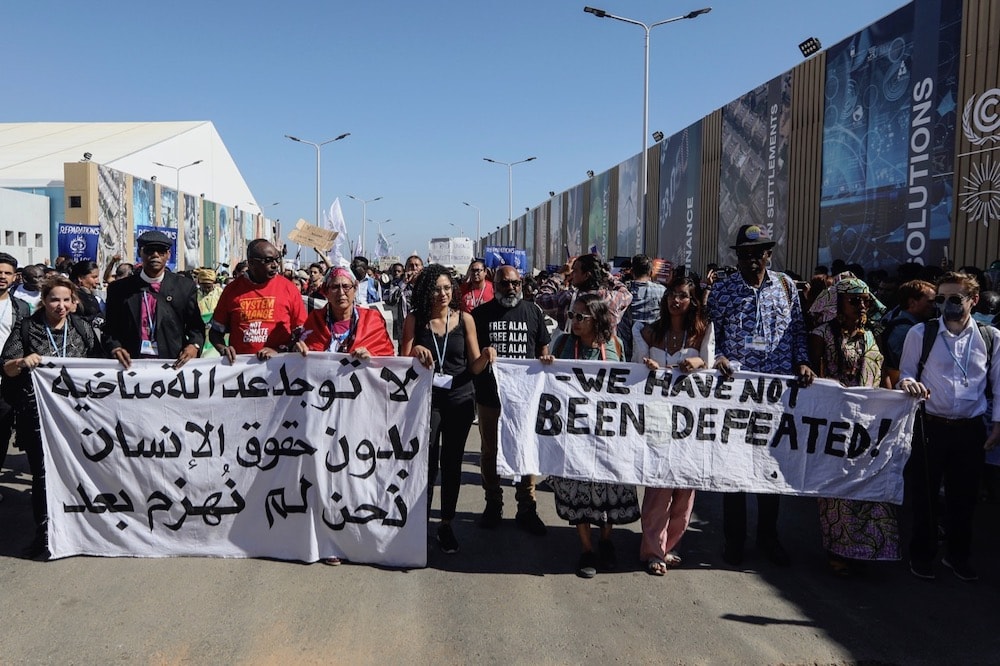Laws and measures adopted by authorities in recent years enable unlawful internet censorship and mass surveillance of users, reports SMEX.
This statement was originally published on smex.org on 27 January 2023.
This past October, Egyptian activists used social media to call for protests in parallel with the 27th UN Climate Change Conference (COP27) in Sharm el-Sheikh, despite demonstrations being banned in Egypt. In response, security forces set up checkpoints to search people’s mobile phones and detain those with anti-government content on their devices.
The Egyptian government continued to commit human rights violations during COP27, especially with regard to Egypt’s most prominent social and political activist. Alaa Abdel Fattah has been arbitrarily held in pretrial detention for over nine years, along with other activists and prisoners of conscience, as documented by Human Rights Watch and Amnesty International.
Although the state of emergency was lifted in October, the government integrated the decree’s provisions under other laws, and Emergency State Security Courts continued to prosecute peaceful rights and political activists. It is therefore no secret that 2022 was a brutal year for digital rights activists in Egypt.
Silencing dissenting voices online
Egyptian authorities detain individuals for digitally publishing information that contradicts official narratives or criticizes the Egyptian government. Similarly, security agencies are ordered by the Public Prosecution to track, target, and accuse dissenting social media users of “undermining the social values and principles of the Egyptian people.”
In fact, the Egyptian Public Prosecution has not only issued arrest warrants against several digital activists, but they have also called for broadening the scope of legislation on digital platforms to guard what it referred to as the “new borders,” or the borders of cyberspaces.
An activist and attorney who wished to remain anonymous said in an interview with SMEX that “the Egyptian authorities use the Anti-terrorism Law as a pretext to prosecute their opponents, especially social media users and bloggers, by the hundreds. It is a form of digital oppression, whereby the authorities encroach upon people’s digital privacy, search their phones, prosecute activists and exploit legislations to block websites or applications and shut down the internet.”
For example, on September 9, 2021, the police arrested two members of the same family – Naji Fawzi Ali Mouawad and his nephew – after raiding their houses in the Minya Governorate. Their crime was posting a sarcastic video on Facebook lamenting the dire living conditions of people in Egypt.
On July 31, 2022, police forces arrested Fawzi Bilal in Alexandria for posting a Facebook video asking officials to re-employ his son in the Ministry of Interior’s Traffic Department. Bilal was in his seventies.
Moreover, on December 26, 2022, the Supreme State Security Prosecution renewed the detention of Ahmad Abel Majid Arabi, who was accused of expressing his political views on social media, and they arrested translator Marwa Arafa under the charge of “joining a terrorist group.”
Meanwhile, President Abdel Fattah Al-Sisi claimed to take new steps to promote human rights, such as launching the National Human Rights Strategy in September 2021. The new strategy is founded on four main pillars: civil and political rights; economic, social, and cultural rights; the rights of women, children, people with disabilities, the youth and elderly; and education and capacity building on human rights.
Despite these steps, security agencies continue to violate citizens’ right to freedom of expression and opinion. The government’s efforts appear to be mere attempts to polish the country’s image under international criticism.
Legalizing website blocking
Egyptian authorities have legalized their oppressive policies by issuing laws and legislations that allow the blocking of certain websites, such as the IT Crime Law and the Law on the Organization of the Press and Media.
In 2018, under the pretext of protecting national security, the government issued Cybercrime Law No. 175 to permit website blocking as a preliminary measure. This law gave investigative authorities the power to block websites whose content they saw as “constituting a crime” or “posing a threat to national security or economy.” It also allows police forces to request “urgently” blocking a website before the issuance of a judicial ruling.
In the same year, Law No. 180 on the Organization of the Press and Media was issued. This law gave the Supreme Media Regulatory Council broad powers to impose different forms of censorship over websites and personal accounts. Article 91 of the law gave the Council the right to take action against violators, including the “suspension or blocking of a website, blog, or account if it publishes or transmits misinformation or content that incites people to commit acts of violence or hate, violates the law, discriminates between citizens, promotes racism or extremism, engages in defamation, libel or slander against individuals or insults a religion or religious beliefs.”
The executive regulations of the Law on the Organization of the Press and Media and the list of penalties adopted by the Supreme Media Regulatory Council specify the rules for blocking websites and personal profiles on social media platforms.
On April 20, 2022, Egyptian authorities, armed by this law, blocked 12 websites, social media accounts, and YouTube channels for “violating media laws, standards, and charters of honor” and “failing to obtain licenses.” In addition, on November 6, 2022, Egyptian authorities blocked several human rights and news websites during the COP27 Climate Conference, according to The Guardian.
They also blocked Telegram on mobile and desktop in October 2020, on both wired and mobile data networks. The app was restored at the beginning of 2021, without any official statement on the matter.
The legislations and measures adopted by the Egyptian authorities in the past few years, especially amid the highly centralized infrastructure and administration, enable unlawful internet censorship and mass surveillance of users. Will the situation improve in 2023, or will we witness a new wave of human rights violations?



